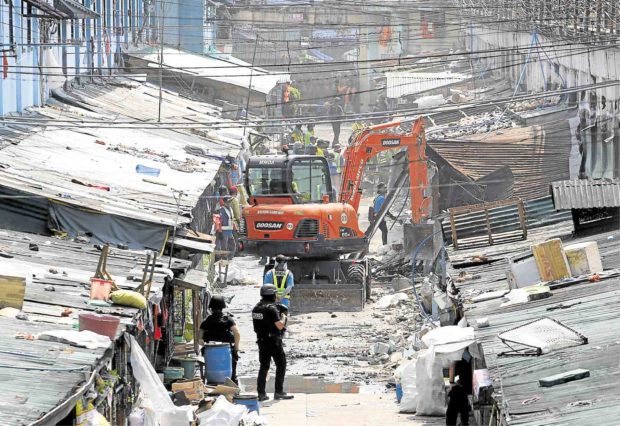Bilibid conditions deplored after demolition of ‘kubol’

CONTROVERSIAL SOLUTION File photo shows demolition of illegal structures at the New Bilibid Prison on Oct. 12. —MARIANNE BERMUDEZ
MANILA, Philippines — Some inmates, including the elderly, were found to have been sleeping outdoors after their “kubol” (sleeping quarters) were dismantled during the weekslong demolition in New Bilibid Prison in Muntinlupa City.
The “very worrisome” scene was what confronted prisoner rights advocacy group Kapatid and several activist lawmakers when they visited Bilibid’s maximum security compound on Tuesday.
They were supposed to request a dialogue with Bureau of Corrections (BuCor) chief Director General Gerald Bantag “to know the problems that burden the prisoners and their relatives, and to thresh these out in an open, cordial and responsive manner.”
Bantag, however, was not present in his office that time.
Iron sheets
Article continues after this advertisementKapatid spokesperson Fides Lim recounted seeing several inmates sleeping on bunk beds outside of their supposed cells, sheltered only by galvanized iron sheets pieced together.
Article continues after this advertisementElectricity in the maximum security compound was only available from 4 p.m. to 8 a.m.
Kapatid wanted to know, in particular, the conditions facing the 61 political prisoners in Building 11 at Bilibid’s west quadrant.
Lim said they received reports that both sections A and B of Building 11 were demolished and had been in complete lockdown for weeks, without electricity and water.
“This is most troubling since we have several elderly and ailing political prisoners. One of them is already 80 years old, another suffers from malignant prostate cancer and some have tuberculosis,” she said.
Kapatid asked BuCor to allow Red Cross to set up tents in place of the demolished kubols to serve as makeshift shelters for inmates.
“It should have been well planned,” Lim said of Bantag’s “haphazard” decision to tear down the kubol. “You can’t just make moves without thinking of the consequences. We’re talking about human lives [being affected] here.”
From Oct. 9 to 25, the newly appointed BuCor chief ordered clearing operations, with the aid of heavy equipment from the Department of Public Works and Highways, and more than a thousand policemen acting as security of the demolition team.
At that time, visitation privileges of inmates were suspended by BuCor and restored only on Oct. 30.
Drugs and contraband
Lim said BuCor did not have to destroy every kubol just to get drugs and contraband out of Bilibid.
“There were now a lot of guards at maximum security. There’s BuCor, then they added Special Action Force troopers, and now there’s also hundreds of BJMP (Bureau of Jail Management) and PNP (Philippine National Police) officers. I think that’s enough for them to do their jobs,” she said.
In the first place, she pointed out, the kubol were put up because of inadequate prison facilities.
Congestion rate inside Bilibid is at 332 percent. Based on BuCor data, more than 27,000 convicts are serving sentence in that complex, which could accommodate only some 6,435 inmates.